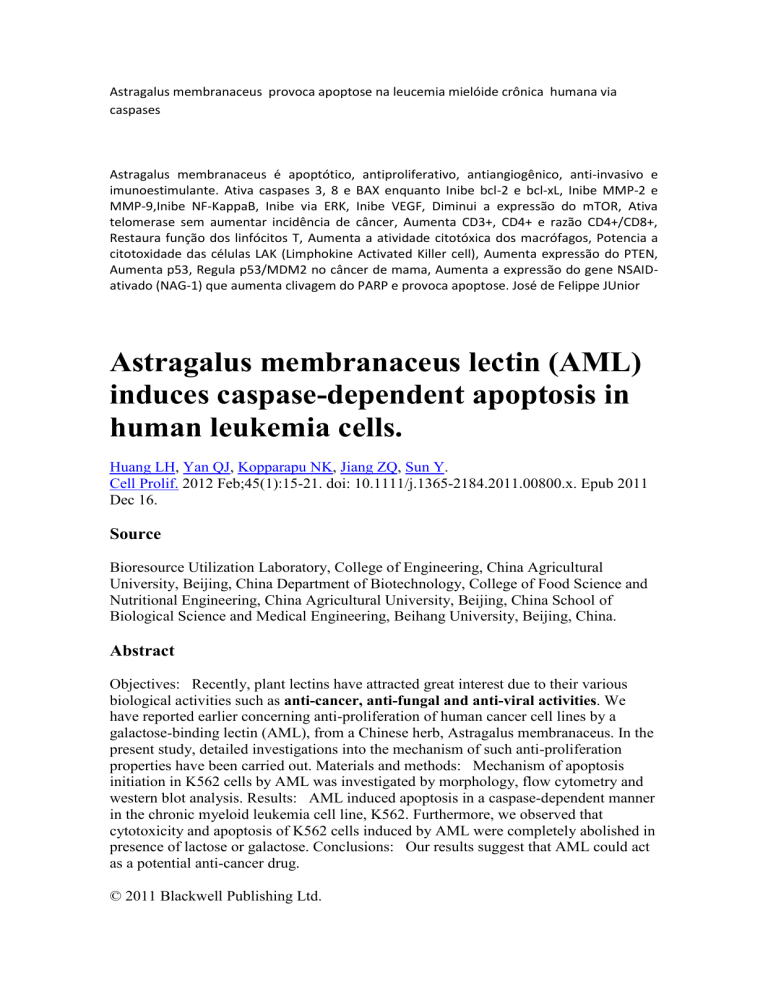
Astragalus membranaceus provoca apoptose na leucemia mielóide crônica humana via
caspases
Astragalus membranaceus é apoptótico, antiproliferativo, antiangiogênico, anti-invasivo e
imunoestimulante. Ativa caspases 3, 8 e BAX enquanto Inibe bcl-2 e bcl-xL, Inibe MMP-2 e
MMP-9,Inibe NF-KappaB, Inibe via ERK, Inibe VEGF, Diminui a expressão do mTOR, Ativa
telomerase sem aumentar incidência de câncer, Aumenta CD3+, CD4+ e razão CD4+/CD8+,
Restaura função dos linfócitos T, Aumenta a atividade citotóxica dos macrófagos, Potencia a
citotoxidade das células LAK (Limphokine Activated Killer cell), Aumenta expressão do PTEN,
Aumenta p53, Regula p53/MDM2 no câncer de mama, Aumenta a expressão do gene NSAIDativado (NAG-1) que aumenta clivagem do PARP e provoca apoptose. José de Felippe JUnior
Astragalus membranaceus lectin (AML)
induces caspase-dependent apoptosis in
human leukemia cells.
Huang LH, Yan QJ, Kopparapu NK, Jiang ZQ, Sun Y.
Cell Prolif. 2012 Feb;45(1):15-21. doi: 10.1111/j.1365-2184.2011.00800.x. Epub 2011
Dec 16.
Source
Bioresource Utilization Laboratory, College of Engineering, China Agricultural
University, Beijing, China Department of Biotechnology, College of Food Science and
Nutritional Engineering, China Agricultural University, Beijing, China School of
Biological Science and Medical Engineering, Beihang University, Beijing, China.
Abstract
Objectives: Recently, plant lectins have attracted great interest due to their various
biological activities such as anti-cancer, anti-fungal and anti-viral activities. We
have reported earlier concerning anti-proliferation of human cancer cell lines by a
galactose-binding lectin (AML), from a Chinese herb, Astragalus membranaceus. In the
present study, detailed investigations into the mechanism of such anti-proliferation
properties have been carried out. Materials and methods: Mechanism of apoptosis
initiation in K562 cells by AML was investigated by morphology, flow cytometry and
western blot analysis. Results: AML induced apoptosis in a caspase-dependent manner
in the chronic myeloid leukemia cell line, K562. Furthermore, we observed that
cytotoxicity and apoptosis of K562 cells induced by AML were completely abolished in
presence of lactose or galactose. Conclusions: Our results suggest that AML could act
as a potential anti-cancer drug.
© 2011 Blackwell Publishing Ltd.
PMID:22172162
